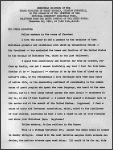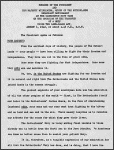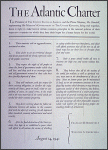
Documents Related to FDR and Churchill
Background
A close friendship and the excellent working relations that developed between U.S. President Franklin D. Roosevelt and British Prime Minister Winston Churchill were crucial in the establishment of a unified effort to deal with the Axis powers. This working relationship was highlighted by many joint appearances and agreements that not only addressed the immediate needs of the Allies but also the planning for a successful peace following victory.
In late December 1941, shortly after entry of the United States into World War II, Churchill met in Washington, D.C., with Roosevelt in what became known as the First Washington Conference, code name "Arcadia." The conference placed first priority on the Atlantic theater and the defeat of Germany and Italy. On December 24, 1941, Roosevelt and Churchill delivered Christmas greetings to the nation and the world from the South Portico of the White House during the lighting of the National Community Christmas Tree. FDR closed his short message with the following passage, "And so I am asking my associate, [and] my old and good friend, to say a word to the people of America, old and young, tonight, -- Winston Churchill, Prime Minister of Great Britain." These words clearly describe the relationship that these two leaders of the "Free World" had struck.
FDR had begun the long-term correspondence that developed into a close working friendship with Winston Churchill in early 1940 while Churchill was still first lord of the admiralty. The initial interaction was to encourage a neutral America to take a more active anti-Axis role.
In July 1940 newly appointed Prime Minister Churchill requested help from FDR, after Britain had sustained the loss of 11 destroyers to the German Navy over a 10-day period. Roosevelt responded by exchanging 50 destroyers for 99-year leases on British bases in the Caribbean and Newfoundland. A major foreign policy debate erupted over whether the United States should aid Great Britain or maintain strict neutrality.
In the 1940 presidental election campaign Roosevelt promised to keep America out of the war. He stated, "I have said this before, but I shall say it again and again and again; your boys are not going to be sent into any foreign wars." Nevertheless, FDR wanted to support Britain and believed the United States should serve as a "great arsenal of democracy." Churchill pleaded "Give us the tools and we'll finish the job." In January 1941, following up on his campaign pledge and the prime minister's appeal for arms, Roosevelt proposed to Congress a new military aid bill.
The plan was to "lend-lease or otherwise dispose of arms" and other supplies needed by any country whose security was vital to the defense of the United States. This Lend-Lease Act, proposed by FDR in January 1941 and passed by Congress in March, went a long way toward solving the concerns of both Great Britain's desperate need for supplies and America's desire to appear neutral. Secretary of War Henry L. Stimson told the Senate Foreign Relations Committee during the debate over lend-lease, "We are buying . . . not lending. We are buying our own security while we prepare. By our delay during the past six years, while Germany was preparing, we find ourselves unprepared and unarmed, facing a thoroughly prepared and armed potential enemy."
In August 1941, Roosevelt and Churchill met for the first of nine face-to-face conferences ( http://www.fdrlibrary.marist.edu/ww2con95.html) during the war. The four-day meeting aboard a ship anchored off the coast of Newfoundland at Argentia Bay was devoted to an agreement on war aims and a vision for the future. The document created at this meeting was the The Atlantic Charter, an agreement on war aims between besieged Great Britain and the neutral United States. The charter set forth the concepts of self-determination, end to colonialism, freedom of the seas, and the improvement of living and working conditions for all people. Many of the ideas were similar to those proposed by Wilson's Fourteen Points, but not accepted by our allies at the Versailles Conference at the close of World War I.
From 1941 when they first met until FDR's death in 1945, Roosevelt and Churchill sustained a close personal and professional relationship. Playwright Robert Sherwood later wrote, "It would be an exaggeration to say that Roosevelt and Churchill became chums at this conference. . . . They established an easy intimacy, a joking informality and moratorium on pomposity and cant, -- and also a degree of frankness in intercourse which, if not quite complete, was remarkably close to it." Roosevelt cabled Churchill after the meeting, "It is fun to be in the same decade with you." Churchill later wrote, "I felt I was in contact with a very great man who was also a warm-hearted friend and the foremost champion of the high causes which we served."
Two of the documents featured in this lesson, the typewritten drafts of Franklin Delano Roosevelt and Winston Churchill's Christmas Eve greeting from the White House in Washington, D.C., on December 24, 1941, and the remarks of the president and Queen Wilhelmina of the Netherlands are housed at the Franklin D. Roosevelt Library in Hyde Park, NY.
Resources
Kimball, Warren. Forged in War: Roosevelt, Churchill and the Second World War. New York: William Morrow & Co., 1997.
The Documents
Franklin D. Roosevelt and Winston Churchill's Christmas Eve Greeting from the White House
December 24, 1941

Click to Enlarge
Franklin D. Roosevelt Library
First Carbon Files
1933 - 1945
National Archives Identifier:
197366
Remarks of President Roosevelt and
Her Majesty Wilhelmina, Queen of the
Netherlands on the Transfer of a Ship
Under the Lend-Lease Act
August 6, 1942

Click to Enlarge
Franklin D. Roosevelt Library
First Carbon Files
1933 - 1945
National Archives Identifier:
198012
The Atlantic Charter
August 14, 1941

Click to Enlarge
National Archives and Records Adminstration
Records of the Office of Government Reports
Record Group 44
National Archives Identifier:
513885
Franklin D. Roosevelt and Winston Churchill at Shangri-la during the Third Washington Conference

Click to Enlarge
Franklin D. Roosevelt Library
Public Domain Photographs
1882-1962
National Archives Identifier:
196836
Table listing the Major
Conferences of World War II
Available from the New Deal Network
www.academic.marist.edu/fdr/biogen2.htm
Transcript of
President Woodrow Wilson's
"Fourteen Points" Speech
Available from the University of San Diego
http://history.acusd.edu/gen/text/ww1/fourteenpoints.html